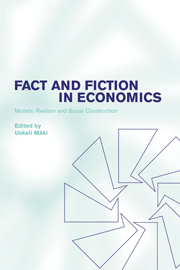Book contents
- Frontmatter
- Contents
- Notes on the contributors
- Preface
- I Introduction
- II Setting the scene
- III Economic models and economic reality
- 5 Credible worlds: the status of theoretical models in economics
- 6 The limits of causal order, from economics to physics
- 7 Econometrics and reality
- 8 Models, stories, and the economic world
- 9 Economic models and reality: the role of informal scientific methods
- 10 Truthlikeness and economic theories
- IV The constitution of economic reality
- V The institutions of economics
- Index
- References
5 - Credible worlds: the status of theoretical models in economics
Published online by Cambridge University Press: 22 September 2009
- Frontmatter
- Contents
- Notes on the contributors
- Preface
- I Introduction
- II Setting the scene
- III Economic models and economic reality
- 5 Credible worlds: the status of theoretical models in economics
- 6 The limits of causal order, from economics to physics
- 7 Econometrics and reality
- 8 Models, stories, and the economic world
- 9 Economic models and reality: the role of informal scientific methods
- 10 Truthlikeness and economic theories
- IV The constitution of economic reality
- V The institutions of economics
- Index
- References
Summary
I write this chapter not as a methodologist or as a philosopher of social science – neither of which I can make any claim to be – but as a theoretical economist. I have spent a considerable part of my life building economic models, and examining the models that other economists have built. I believe that I am making reasonably good use of my talents in an attempt to understand the social world. I have no fellow-feeling with those economic theorists who, off the record at seminars and conferences, admit that they are only playing a game with other theorists. If their models are not intended seriously, I want to say (and do say when I feel sufficiently combative), why do they expect me to spend my time listening to their expositions? Count me out of the game. At the back of my mind, however, there is a trace of self-doubt. Do the sort of models that I try to build really help us to understand the world? Or am I too just playing a game, without being self-critical enough to admit it?
My starting point is that model-building in economics has serious intent only if it is ultimately directed towards telling us something about the real world. In using the expression “the real world” – as I shall throughout the chapter – I immediately reveal myself as an economic theorist.
- Type
- Chapter
- Information
- Fact and Fiction in EconomicsModels, Realism and Social Construction, pp. 107 - 136Publisher: Cambridge University PressPrint publication year: 2002
References
- 30
- Cited by



